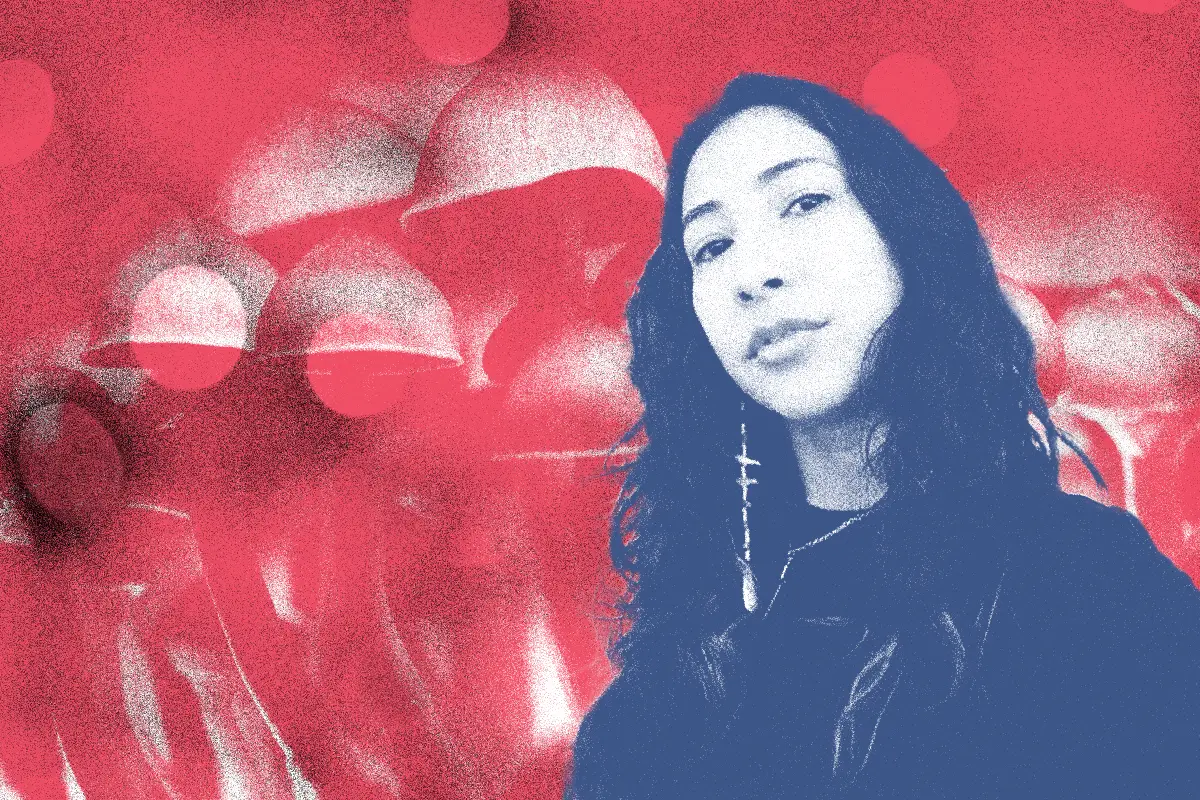While grounded in historic subjugation, colonization is not merely rooted in the past. It is a process and concept that continues to influence modern societies in wide-ranging and far-reaching ways — from the forced removal of Indigenous populations from their lands and waters, to the exploitation of resources and continued oppression of communities of color through the global War on Drugs.
For psychotherapist Danielle Herrera, the untangling of colonization is a tangible unknown: an ongoing (re)negotiation of power, place, identity, and sovereignty. “It moves,” she says. “It is amorphous. We can go towards it, but we do not stop there.” We keep going.
In this installment of Decolonizing Psychedelics, Danielle and I discuss psychedelic exceptionalism, the systemic issues of psychotherapy and psychedelic therapy, and ways we should frame the notion of “right relationship.”
DoubleBlind: I am inspired by the way you begin your chapter on “Decolonizing Psychedelic Therapy: A Prayer for Awareness, Call for Commitment, and Offering of Applications” in Integral Psychedelic Therapy: The Non-Ordinary Art of Psychospiritual Healing. Would you be willing to start our conversation with an invocation?
Danielle Herrera: Absolutely. I will start off with the “Towards the One” prayer which is in my Sufi tradition, and then call in some ancestors: “Towards the one, the perfection of love, harmony, and beauty; the only being united with all the illuminated souls who form the embodiment of the message, the spirit of guidance. In honoring this collaboration, this conversation, this dialogue towards this decolonial, devoted work, we honor, we devote, we invoke the ancestors, the guides, the spirits human and non-human, elemental, and plant. To this intelligent now, for the benefit of all, unto the harm of none—with the intention of liberation for all beings everywhere.”
How do you name yourself and your identity?
I like to start with a decolonial introduction. Rather than naming letters after a last name and affiliations with organizations and institutions, I start with relationships. My name is Danielle. I use she/her pronouns. I identify as a queer, multi-racial being of Indigenous—both Pascua Yaqui and Chiricahua Apache—ancestry, as well as Visayan [Filipino] ancestry and some Chicano ancestry. I grew up in a Chicano cultural context. I live towards my ideal as a Universalist Sufi and am in an Inayati order. Currently, love is primarily experienced in my roles as a partner and as a daughter, auntie, sister, psychotherapist, and poet.
As a way to place us in this conversation, how did you come to medicine work? And what term do you use … medicine, psychedelics?
Internally, I hold the word “medicine.” When I am with clients, I use whatever words are most comfortable for them, as they have their own relationship with the [medicine] spirit.
I came into the psychedelic-psychotherapy world through harm reduction. My parents and stepfather were chaotic drug users. They have different relationships to drugs now but, when I was growing up, my mother had a pretty chaotic relationship with methamphetamine so I had a lot of engagement with radical harm reduction movements before I even knew their name. Because of homelessness and [their] chaotic drug use, middle school me was reading psychology textbooks and interacting with social workers. The social workers were women of color, soft and tender, and I was drawn to the way they moved through the world.
When I became an adult, I started studying psychology in an attempt to understand what was happening with my mother. Not knowing that she was using drugs, I thought she had paranoid schizophrenia. When I had a better understanding, I said I would not work with drugs because it was too close to home. I thought I would work with children, but quickly realized that still meant working with adults and drugs.
As I was doing harm reduction work, I started training in ketamine-assisted psychotherapy and working with full-spectrum drug use [supporting] folks who had out-of-alignment relationships with drugs and those who had the access to ketamine for healing. I was also doing my own therapy and having lots of mystical experiences as I developed my own personal relationships with medicines.
What I’m interested in is people, their relationships with drugs, and their experiences with touching the divine through those relationships.
I love that — “touching the Divine.” And that you are naming “drugs” because there is that element of psychedelic exceptionalism in the push by some folks to carve out psychedelics as a special class of substances rather than part of a continuum.
Definitely, yes. Big feelings there and lots of agreement with Dr. Carl Hart. Why are psychedelics categorized as being better than other drugs?
There is a schism between recreational use and medicalized use, and also a split or lack of recognition of a healing continuum and the full range of what healing containers and spaces can look like.
Right. Like, who is allowed to have fun—and in what ways? And who is allowed to access pleasure and in what ways? If the only acceptable forms of pleasure, joy, and rest are inaccessible financially, then it is not fair to judge people’s experiences with recreational drugs that are accessible. For example, in session with a low-fee client who couldn’t afford to travel, they felt like they traveled to France. The session was both recreational and therapeutic. They can exist hand-in-hand.
In your chapter, you write that decolonization is “the process of undoing colonialism,” and—as written in the foundational paper by Eve Tuck and Wayne Yang—that “it is not a metaphor.” There is expansiveness in the undoing process and real precision in saying, “This is about undoing a very particular set of actions enacted by a particular group.” I share this because what I have seen, and what inspired this series, is that “decolonization” is a term that is sometimes being used when people are actually advocating for diversification or inclusion. They are not the same.
One hundred percent. I notice frustration with the word “decolonization” being heavily used in academia in ways that are not digestible to the average person and keeps decolonization [as a metaphor] and concept only accessible within academia. But decolonization belongs to the people doing frontline work. We have to ask, “Is there a way I can move towards that tangible unknown [of decolonization] and against the undertow of a dominant structure?”
And that inquiry also applies to traditional psychotherapy. Informed by Western thought and rooted in individual interaction, it is probably inadequate for healing collective trauma caused by legacies of colonization, enslavement, and capitalism.
I always say, “Psychotherapy has blood on its hands.” All models of psychotherapy are pretty much built around the individual. It is not collective. It is not systemic. It is in support of helping you adjust to the system that you live in, not—like we said in the prayer—to the benefit of all, harm of none, and liberation of all beings. You have heard the term “grandfathers of psychotherapy” because they are grandfathers. They are cis-hetero white men who were not very progressive in their politics.
In psychotherapy, we are often in this place of having symptoms that are the result of the socio-political, cultural landscape in which we are trying to survive. The focus of therapy, then, is to try to adjust you to those systems of oppression. That is not liberation.
What does decolonized therapy look like?
I’ll use the metaphor where people turn the arrow towards their hearts to reveal the impact colonialism has had on us. People say, “It is my fault. I am the one that is failing to adjust to the system. I am broken. Why am I so incapable?” Our task is to turn our scrutiny outward, toward the system, recognizing it as the responsible party for the natural response to something so violent. When we point the blame at colonialism, capitalism, or white supremacy, the resulting anger is necessary. If you’re not angry, you’re not paying attention.
All these intersecting systems of oppression keep us from our essence. A decolonial approach is to bring the heart back in, to bring softness and love back in. We can then say, “Okay, all these systems are doing this to us,” and ask, “How do we become better partners, friends, daughters, sisters, aunties, uncles, and neighbors? How do we nourish relationships so all of us are taken care of?” The image that comes up is mycelial: we have to work against individualistic paradigms and move back toward the collective.
Recognizing our interdependence as we engage in a return to self. There is also the other piece of this: the so-called Psychedelic Renaissance that, as you write, leans toward appropriation rather than right relationship. Is decolonization even possible in this context?
In a United States context of psychedelic-assisted psychotherapy, absolutely not. And yet we can’t be like, “Fuck it. I am not going to do anything that is responsible. I might as well be hyper-individualized and medicalize the experience.” That is not the response.
What is the response?
The acknowledgment of the tangible unknown. Even [among] the people who are interested in the science, there is a responsibility to integrate other epistemologies of knowing … a magnetism towards the divine. We can acknowledge that something else is going on in the space around us, break our paradigms a little bit, and open up to weaving the [mystical and scientific] worlds together.
Something that has come up in earlier conversations in this series is that a critical component of decolonization is slowing down.
Urgency is one of the primary tools of colonization. Similarly, the rush to bring on a new consciousness. I can understand and empathize, but we’re not going to liberate through replication of dominant paradigms that did not work. Throw them out. Try something new. Perhaps the Indigenous elders knew a thing or two. Try something new that’s old.
There are so many elements of decolonization—in the medicine, spaces in which we engage, people we serve and, as you have shared, decolonization in how we facilitate.
What I would suggest is that our responsibility as psychedelic therapists is to take what we have learned through training and education, and move towards our own [sense] of how we are supposed to do the work—from our core, our truest self, the place of intuitive ethical standards of “This is what is right, because I can feel it being right, not because somebody told me that it should be right.”
Question the process. Ask, “Where did I learn this from? Who told me? What are their identities and do I want to continue to transmit, specifically, their perspective?” And also, “Why this protocol? Who does it benefit?”
What about decolonizing the setting?
It is thinking about the way that you actually shape the container into which somebody will come. Psychedelic therapy is akin to a temple: a place of union with the divine. You want to be conscious and client-centered, [sensitive to] what is going to benefit the client, and be in collaboration with them. “How is this space for you? What do we need to change? What will make this feel more like yours when we are in ceremony together?”
That collaboration upends the power dynamic in a traditional therapeutic alliance. It’s humbling and humanizing, as is what you share in your work around addressing internalized oppressions and embracing sacred joy.
We people of color, especially, do not have a system that says, “Yes, you are allowed to rest.” When we rest or access joy and pleasure as acts of reclamation [of our ancestry], they become the most revolutionary acts. It gets forgotten, but it is the part of decolonial work I love—allowing us to have relationships with healing and spirituality that are not separate from pleasure.
Does what you have shared apply to anyone in a position of holding space for others?
Yes. There are plenty of non-licensed practitioners, some of whom have been in the underground for many years and do not receive as much credibility as people who have the letters after their last name. Part of decolonizing is not saying that the people with the most letters after the last name have the most validity. Even as we hold people to high standards and allow for when people do benefit from seeing somebody who has the letters after their name. We honor that, too.
You write, “If nothing else convinces you of the need to prioritize a decolonized lens in the field of psychedelic therapy, let it be this: there is a moment when the relationship between an individual and a medicine offers an opening, an opportunity for a changed narrative. In this moment, an orchestrator of space provides a set and setting that resurrects Spirit and ritual. This moment calls into question belief systems that position healing as passive and purchased (capitalism), isolated (individualist over communal), occurring solely through talking rather than being (cognitive over embodied/emotionally expressive) and separated from the divine (personal rather than transpersonal). In this moment, entire cultures are remembered. Culture is medicine. Medicine is culture.”
That passage was inspired by my MDMA therapy training. We are not just giving somebody a mere pill. We are in an agreement that something is happening. With the medicine—and I am thinking about MDMA—you can feel the spirit enter the room. Maybe for people who are more scientific, they are like, “This is just the effects of the medicine.” Either way, there is an opening. In that place, you can help people remember expansiveness, their right to feel pleasure and open to a sense of safety, and [connect to] ancestral memory. In that, there is such an opportunity for healing. Medicine is culture.
I’ll finish with the last part of that passage: “Decolonizing psychedelic therapy thus begins with Spirit. Spirit as in the ineffable, as in the nameless thread of everything that is. This is the first of all practical considerations, and everything else follows. And everything else must be enrobed in it.”
Everything.
###
###Preeti Simran Sethi is a writer, educator, mental health coach, and psychedelic intake and integration support who advocates for culturally attuned care in psychedelics. Find more on her work here. This interview is made possible with editing support from Dennis Winders and the Ferriss-UC Berkeley Psychedelic Journalism Fellowship. It has been edited and condensed.
DoubleBlind is a trusted resource for news, evidence-based education, and reporting on psychedelics. We work with leading medical professionals, scientific researchers, journalists, mycologists, indigenous stewards, and cultural pioneers. Read about our editorial policy and fact-checking process here.
DoubleBlind Magazine does not encourage or condone any illegal activities, including but not limited to the use of illegal substances. We do not provide mental health, clinical, or medical services. We are not a substitute for medical, psychological, or psychiatric diagnosis, treatment, or advice. If you are in a crisis or if you or any other person may be in danger or experiencing a mental health emergency, immediately call 911 or your local emergency resources. If you are considering suicide, please call 988 to connect with the National Suicide Prevention Lifeline.
DoubleBlind Mag Read More



